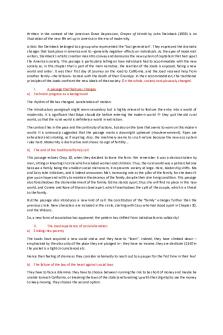Grapes Of Wrath Essay : Chapter 12 (departure) PDF

| Title | Grapes Of Wrath Essay : Chapter 12 (departure) |
|---|---|
| Author | Alexandra Dien |
| Course | Littérature |
| Institution | Université Savoie Mont Blanc |
| Pages | 2 |
| File Size | 90.8 KB |
| File Type | |
| Total Downloads | 5 |
| Total Views | 134 |
Summary
Analysis and commentary of Chapter 12 of Grapes of Wrath by John Steinbeck....
Description
Written in the context of the American Great Depression, Grapes of Wrath by John Steinbeck (1939) is an illustration of the new life set up in America in the era of modernity. Artists like Steinbeck belonged to a group who represented the “lost generation”. They expressed the dramatic changes that took place in America and its –generally negative- effects on individuals. As the apex of modernist writers, Steinbeck’s artistic creation meant to convey and denounce the new system of capitalism that had upset the American society. This passage is particularly telling on how individuals had to accommodate with the new society as, in this chapter that is part of the main narrative, the reaction of the Joads is exposed, facing a new world and order. It was their first day of journey on the road to California, and the Joad received help from another family –the Wilsons- to deal with the death of their Grandpa. In their accommodation, the traditional principles of the Joads confront the new ideals of that society. On the whole, society conspicuously changed.
a)
I. A passage that features changes Technical progress as a background
The rhythm of life has changed. Acceleration of motion: The introductory paragraph might seem secondary but is highly relevant to feature the entry into a world of modernity. It is significant that Gdpa should die before entering the modern world they quit the old rural world, so that the rural world is definitely a world in extinction. The contrast lies in the pace and the continuity of actions, but also on the tone that seems to warn on this modern world: It is ominously suggested that the passage marks a downright upheaval (=bouleversement). Pipes are exhausted and smoking, as if expiring. Also, the machinery seems to crush nature because the new eco system rules hard. Modernity is destructive and shows no sign of fertility… b) The end of the traditional family cell This passage echoes Chap 10, when they decided to leave the farm. We remember it was a decision taken by men, sitting or kneeling in circle which excluded women and children. Thus, the rural world was a patriarchal one because a family being the smallest social microcosm, it represents society at large. Here, leadership shifts. Ma and Sairy take initiatives, and it indeed announces Ma’s increasing role as the pillar of the family, for she doesn’t give up on hope and will try to maintain the decency of the family, despite their dire living condition. This passage also foreshadows the dismemberment of the family: Gdma stands apart, thus she will find no place in this new world, and Connie and Rose of Sharon stand apart, which foreshadows the split of the couple, which is a threat to the family. But the passage also introduces a new kind of cell: the constitution of the “family” enlarges further than the previous circle. New characters are included in the circle, starting with Casy who had stood apart in Chapter 10, and the Wilsons. So, a new form of association has appeared: the pattern has shifted from individualism to solidarity!
a)
II. The Joad experience of social alienation Sinking into poverty
The Joads have acquired a new social status and they have to “learn”. Indeed, they have climbed down – emphasised by the obscurity of the place they are plunged in-: they have no income, they are destitute ($140 in the pocket is a tight circumstance) etc. Hence their feeling of shame as they consider ashamedly to reach out to a pauper for the first time in their live! b) The failure of the law of the heart against social laws They have to face a dilemma: they have to choose between running the risk to be short of money and maybe be unable to reach California, or breaking the laws of the state (and breaking up with their dignity) to sae the money to keep moving. They choose the second option.
“law can’t be followed if not in decency” but they give up tp this ideal and lose even more in decency, But they still abide by social laws, thar have changed under eco pressures and consider dead men like money, for they want to prove they are not guilty and are still good people. Indeed, they do not “hide Gdpa in the night”. c)
The failure of the state’s authority
So, it is logical to state that the system is greedy, and thus pitiless, inhuman. Energy of the state is misplaced, as they have more “interest in a dead man” than a living one. It is sarcastic. Not caring about the citizens when they are alive, while caring about them once dead is absurd, but in the whole proves that the system is inhuman by not protecting its citizens. III. The need for new morals a) Joads are depicted as essentially moral characters Despite what is imposed on them, the Joads subsist in morality against an immoral and inhuman system. Their undeniably moral status is suggested by their behaviour towards the Wilsons: the Wilsons are poorer than the Joads, but they are treated as equals. The Joads do not look down on the Wilsons, they exchange with courtesy (their exchange is polite and civilised), with great respect (their exchange is warm as they call them “folks”), and on the top of all, they share their food, for they are grateful to them for helping with the last moments of Gdpa. The Joads are also of noble common-sense, contrary to the inhuman system, for they feel “beholden” and insist on repaying the Wilsons for their assistance. This impression of being indebted from the Joads comes from the fact that they were used to be requested instant payment by the landowners. Also, at the end of the scene, the Joads invite the Wilsons to take part in their small democracy. b) Choosing pragmatic morality But even morally, the Joads do have to accommodate: They expressed wholesome honesty when saying they “weren’t ashamed” when Tom killed a boy. In the same spirit, they feel no guilt in breaking the social laws and theories, because this spirit they are inspired by is that of transcendentalism. Indeed, when Casy said “you got the right to do what you’ve got to do”, it was no tautology! It grounds on the transcendentalist philosophy which is the belief that laws, instead of being moral absolutes, are relative. Emerson, spearhead of this philosophy, held that each man is a part of the mighty, the divine, thus, each man has an intuition of moral truth, an innate sense of goodness. So, the Joads acted according to what they hold to be just: taking the urgencies of the situation –they are pressed to decide to then keep moving on-, the Joads answered to the dilemma imposed by the system with pragmatism. Indeed, they give priority to experience rather than social laws and theories. They make an exception to the common rule, despite their morality to act as good citizens, to adapt to the new situation. They notably base their actions on Tom’s experiences. The Joads, thus, chose pragmatic morality, to counter the immoral aspects of the new system....
Similar Free PDFs

Grapes of Wrath Quotes - Mock
- 2 Pages

Chapter 12 forms of breach
- 18 Pages

IFR Departure Procedure - Inrat
- 2 Pages

Inclusion Essay (12 Jan)
- 7 Pages

12 angry men essay
- 2 Pages

Lesson 12 Essay Activity
- 2 Pages

Essay Outline Template 12
- 2 Pages

Essay plans - Grade: 12
- 20 Pages

Chapter 12
- 14 Pages

Chapter 12
- 20 Pages

Chapter 12
- 18 Pages

Chapter 12
- 2 Pages

Chapter 12
- 16 Pages
Popular Institutions
- Tinajero National High School - Annex
- Politeknik Caltex Riau
- Yokohama City University
- SGT University
- University of Al-Qadisiyah
- Divine Word College of Vigan
- Techniek College Rotterdam
- Universidade de Santiago
- Universiti Teknologi MARA Cawangan Johor Kampus Pasir Gudang
- Poltekkes Kemenkes Yogyakarta
- Baguio City National High School
- Colegio san marcos
- preparatoria uno
- Centro de Bachillerato Tecnológico Industrial y de Servicios No. 107
- Dalian Maritime University
- Quang Trung Secondary School
- Colegio Tecnológico en Informática
- Corporación Regional de Educación Superior
- Grupo CEDVA
- Dar Al Uloom University
- Centro de Estudios Preuniversitarios de la Universidad Nacional de Ingeniería
- 上智大学
- Aakash International School, Nuna Majara
- San Felipe Neri Catholic School
- Kang Chiao International School - New Taipei City
- Misamis Occidental National High School
- Institución Educativa Escuela Normal Juan Ladrilleros
- Kolehiyo ng Pantukan
- Batanes State College
- Instituto Continental
- Sekolah Menengah Kejuruan Kesehatan Kaltara (Tarakan)
- Colegio de La Inmaculada Concepcion - Cebu


